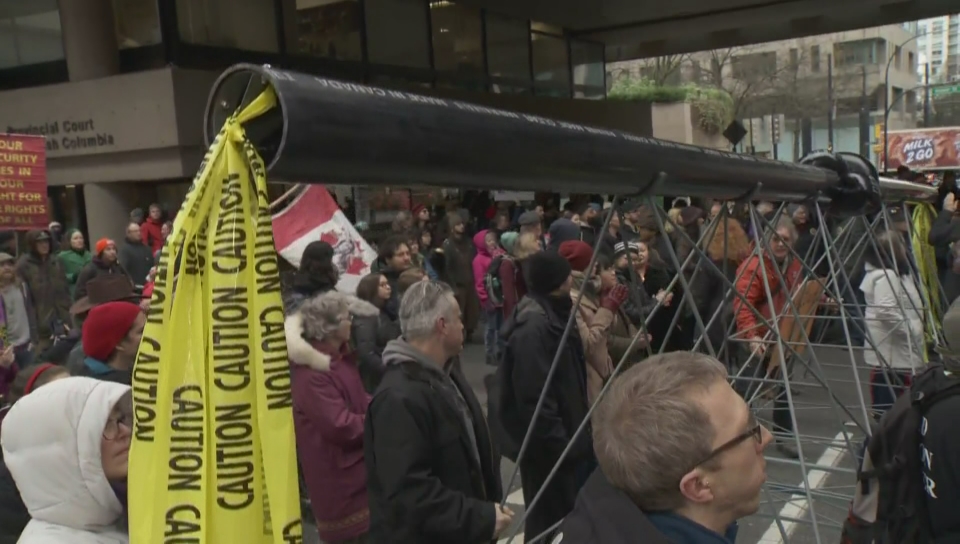Rallies took place Tuesday in support of those arrested at an anti-pipeline protest camp in northern B.C.

The RCMP say officers arrested 14 people Monday evening for allegedly violating the conditions of an interim court injunction that required the removal of a blockade on a forest service road that is preventing access to a pipeline project.
The interim injunction, issued by the B.C. Supreme Court in mid-December, orders anyone who interferes with the Coastal GasLink project in and around the Morice River Bridge to remove any obstructions.
The pipeline route travels through Wet’suwet’en First Nation territory, and the nation’s elected leaders signed a benefits agreement with the province for Coastal GasLink in 2014.
A rally in Victoria called Rise and Resist started at the B.C. legislature totem pole.
Another rally was planed in Courtenay.
In Vancouver, hundreds gathered at the B.C. Supreme Court at 11:30 a.m. to march to Victory Square. Among those in attendance were federal Green Party Leader Elizabeth May and environmentalist and scientist David Suzuki.
“What these people are doing is trying to show that this is their territory and they’re fighting to protect it,” Suzuki said.
“The battle going on at Unist’ot’en camp is a battle for all Canadians about the future of this planet.”
Grand Chief Stewart Phillip of the Union of B.C. Indian Chiefs told a crowd at Victory Square in Vancouver that it would be a watershed year for Indigenous people in the fight against pipelines crossing their lands.
WATCH: Saskatchewan Premier Scott Moe said the federal government is creating “headwinds” for the resource sector, amid growing feelings of western alienation. David Baxter reports.

“We’re starting off 2019 with a bang,” he said to cheers and applause. “I want to say to Prime Minister Trudeau: Welcome to battle ground British Columbia.”

Get breaking National news
The events in B.C. were part of dozens of rallies planned across the country Tuesday.
About 60 people attended the rally in support of the First Nation outside the headquarters of TransCanada Corp. in downtown Calgary. They were greeted by about the same number of pipeline supporters who were encouraged to come out by Canada Action, a Calgary-based lobby group.
Chants of “Build that Pipe” drowned out the blockade supporters initially but the anti-pipeline group found its voice and were soon matching the volume with their own chant of “Consent. Sovereignty!”
Police concerns about a protest in Ottawa forced Prime Minister Justin Trudeau to move to another building close to Parliament Hill to give a speech at a forum.
Tuesday morning, Jeff Brown, Chief Madeek — a head chief of the Gidumt’en clan of the Wet’suwet’en Nation — told Global News, RCMP are now on their way to dismantle the second camp, where about 22 demonstrators are stationed.
“I really appreciate all the support we are getting all over the world,” Brown said. “We should have done this probably a month ago to start this rally because we waited for the court injunction, we waited for the police to arrive and everything was in the last minute. So we have to be a little bit more prepared in the next round.”
Brown added he wasn’t happy with the amount of force the RCMP used against the protesters on Monday.
“There was over probably 100 cops out there with the tactical team. That was way too many people, way too many officers out there.”
- ‘Cocaine lawyer’ for Ryan Wedding has legal licence suspended in Ontario
- Millions of dollars worth of fraud alleged to have happened at B.C. social development ministry
- Filipino BC defends funds distribution with former board members calling for transparency
- Surrey teen shot, killed by police was waving firearm, pointing it at officers: report
In statements issued Monday, the RCMP say they arrived at the camp in northern B.C. around 11 a.m. that day. By 3 p.m., they entered the blockade after a meeting with a number of hereditary elders and Coastal GasLink failed to resolve the issue without police involvement.
By 6:45 p.m., police had made a number of arrests from the blockade set up by Gitdumt’en on Morice West Forest Service Road. RCMP also say they observed a number of fires being lit along the roadway by “unknown persons,” with large trees felled across the roadway.
In their statement, RCMP dispute reports that they jammed communications in the area in order to prevent the media and public from communicating the unfolding situation to the outside world. They say the area is extremely remote, and even police had limited access to communication other than their radios.
Police also say reports that the Canadian military was present are erroneous, saying they have deployed tactical and emergency response teams as part of their “measured and scalable approach to enforcing the court-ordered injunction.”
RCMP say they set up a “temporary exclusion zone,” where the police do not allow access to anyone — media or otherwise — who is not part of the enforcement team.
On Tuesday, Coastal GasLink President Rick Gateman posted an open letter to British Columbians and First Nations.
“We took legal action as a last resort and only after six years of unsuccessful efforts to find a mutual solution,” he wrote. “We remain committed to keeping the lines of communication open.”
— With files from Jon Azpiri and The Canadian Press








Comments